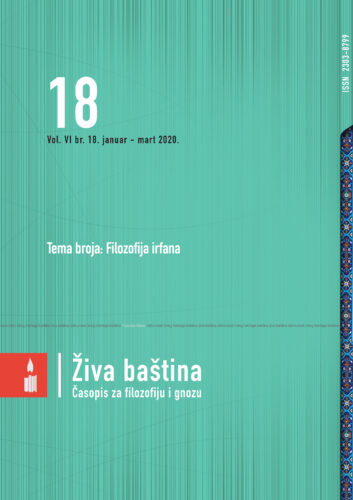Ibn Arebijeva ontologija, koja je postala poznata kao waḥdat al–wujūd (jedinstvo Bitka), iako sam nikad nije koristio taj izraz, predmet je mnogih rasprava i u savremenim akademskim istraživanjima. Ideju da postoji samo jedan wujūd u egzistenciji ‒ naime, Božiji bitak ‒ Ibn Arebi je smatrao najvišim izrazom tevhida (Božijeg jedinstva). Njegova ontologija se često pogrešno smatra panteističkom zbog redukcionističkih sklonosti većine proučavalaca koji su pisali u devetnaestom i početkom/sredinom dvadesetog stoljeća. Pritom treba imati u vidu da ne postoji srednjovjekovna arapska istovjetnica engleskoj riječi pantheism (panteizam). U ovom radu autor na početku sažeto prikazuje Ibn Arebijevu ontologiju, a zatim objašnjava glavne razloge zbog kojih se ona opisuje kao panteistička. Na kraju iznosi nekoliko argumenata kako bi pokazao zašto takav pojam, kao i panenteizam te monizam, posve krivo prikazuju njegov metafizički svjetonazor koji se nije ispoljio u vidu sistema. Dok Ibn Arebi naglašava Božiju imanenciju, on zasigurno nikad ne prestaje isticati Njegovu transcendenciju.
IS IBN ‘ARABī’S ONTOLOGY PANTHEISTIC?
Mohammad Rostom
Abstract
Ibn ‘Arabī's ontology, which has become known as waḥdat al–wujūd (the Oneness of Being), although he himself had never used that term, has been the subject of many debates in contemporary academic research studies. The idea that there is only one wujūd that exists – namely God’s being – was considered by Ibn ‘Arabī to be the highest expression of tawhid (God’s Oneness). His ontology is often wrongly considered to be pantheistic, because of the reductionistic inclinations of the majority of researchers who were writing during the nineteenth and at the beginning/the middle of the twentieth century. At the same time, it should be kept in mind that there is no medieval Arabic synonym for the English word “pantheism”.
In this paper, the author at the beginning summarizes Ibn ‘Arabī’s ontology, and then explains the main reasons for which it has been described as pantheistic. At the end, he presents several arguments to show why such a notion, as well as panentheism and monism, represents his metaphysical worldview, which did not manifest itself in the form of a system, in quite a wrong way. While emphasizing God’s immanence, Ibn ‘Arabī surely never stops pointing out His transcendency.
Keywords: Ibn ‘Arabī, ontology, tawhīd (God’s Oneness), wahdat al-wujūd (the Oneness of Being), system, pantheism, panentheism, monism, God’s transcendency, God’s immanence.
[tags]

